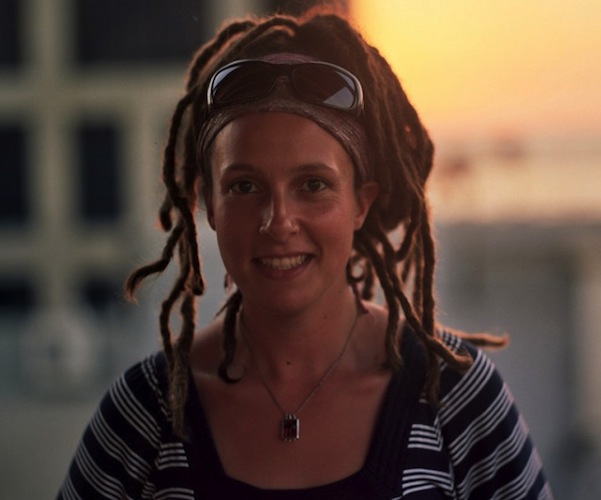Film Review: “Unorthodox” — A Mixed Bag at the Arlington International Film Festival
Unorthodox teases the audience with the come-on that it will be a highly unusual documentary about religion and individual transformation, but it eventually becomes bogged down in less than fascinating stories about the life of the filmmaker.
By Paul Dervis
The Arlington International Film Festival concluded it’s five day extravaganza with Unorthodox, which will be screened at the upcoming Boston Jewish Film Festival (November 5 through 17). The idea for Anna Wexler and Nadja Oertelt’s documentary is intriguing: it follows young, lapsed Orthodox Jews as they search for meaning in their faith by spending a year after high school in the Promised Land. The catch is that the film teases the audience with the come-on that it will be a highly unusual story about religion and individual transformation, but it eventually becomes bogged down in less than fascinating stories about the life of the filmmaker.
Anna Wexler, the daughter of a New Jersey dentist whose home is shrouded in all the trappings of Orthodox Judaism, went from being a happy religious child to a rebellious teenager. Eventually, she left her home and her beliefs to go hang in New York with a group of disenfranchised young Jews. Three of them, Avi, Ester, and Dukes leave to go to Jerusalem and discovered that they could be surprisingly comfortable with their rejected religion and culture.
When the three voyagers returned to America, they all had been transformed in one way or another. This change piqued the interest of Wexler, so much so that she decides to find three others who are about to make the same journey. With a camera in tow, she arranges totravel with them and chronicle their metamorphosis.
Jake, Chaim, and Tzipi are looking to party in Jerusalem when they embark on their joint travels; they assume their stay will be like a prolonged spring break vacation. And at first it is. There are plenty of drugs and alcohol available to these teenagers and they bond with other kids early on. But the ‘good times’ slowly give way to questions about their faith as they gradually become more involved in their studies.
Chaim, seemingly the biggest ‘party animal’ of the three, quickly begins to question his own lifestyle. But he has personal issues back home and cannot stay the year. He regrets his truncated trip, but he still returns to New York. Jake, who is a rock musician, finds to his astonishment that his culture and his music are not mutually exclusive: he forms a band in Israel with other Orthodox Jews. His instructors and their religious teachings help him mature as a musician.
Tzipi, who came to Israel as a very edgy young woman, changes the most. She left America immersed in the contemporary urban club culture and ends her year embracing the conservative dress and viewpoint of her religion. Tzipi’s mother, who had been struggling with cancer, succumbs to the disease. One gets the sense that what Tzipi discovered in Israel enabled her to cope with the loss.
Wexler continues to follow these three young people as well as her earlier comrades after their return to America. Chaim struggled early on, but he has developed into an artist, giving a hip twist to his newfound religious beliefs. Jake has married and his wife is expecting a child: he is living a conventional middle-class life. Tzipi has returned to Israel, married as well, and is teaching and working with at-risk teens.
Of Wexler’s earlier group, Dukes arrived quite hard-core regarding his Orthodox beliefs. In fact, he had taken a vow not to talk to women. As time passed, he softened his hardline stand, but still found much in the Orthodox view of the world to embrace.
Avi is the sad story. He fell back into the urban subculture and in his mid-twenties died of an overdose.
The problem is that too much of this film revolves around Wexler’s convoluted impressions about her own life. Just as we are becoming increasingly invested in the lives of the characters she follows, the director interrupts their compelling stories with musings (often not particularly interesting) about her own (slightly) changing beliefs in Orthodox Jewry. These asides transform the film from what might have been a fascinating exploration of religious lives under pressure to an uncomfortable exercise in self analysis. More irritating, Wexler is never quite clear about where she stands regarding some of the thorny issues the film raises. And that is a shame, given that the director also never goes into detail about how she got to where she is now. She started out a young woman who rejected conventional society: now she is an graduate of M.I.T., with an advanced degree.
Exploring that transformation would have been much more interesting than listening to her asides.
Paul Dervis has been teaching drama in Canada at Algonquin College as well as the theatre conservatory Ottawa School of Speech & Drama for the past 15 years. Previously he ran theatre companies in Boston, New York, and Montreal. He has directed over 150 stage productions, receiving two dozen awards for his work. Paul has also directed six films, the most recent being 2011’s The Righteous Tithe.
Tagged: Anna Wexler, Arlington International Film Festival, Judaism, Paul Dervis, documentary



Actually, Unorthodox had its world premiere at the 2013 Boston Jewish Film Festival. But there’s lots of wonderful documentaries screening at the 26th Annual BJFF, November 5-17. For a full schedule, please visit bjff.org.
My mistake — but a valuable reminder of the upcoming 2014 Boston Jewish Film Festival — and its lineup of documentaries.